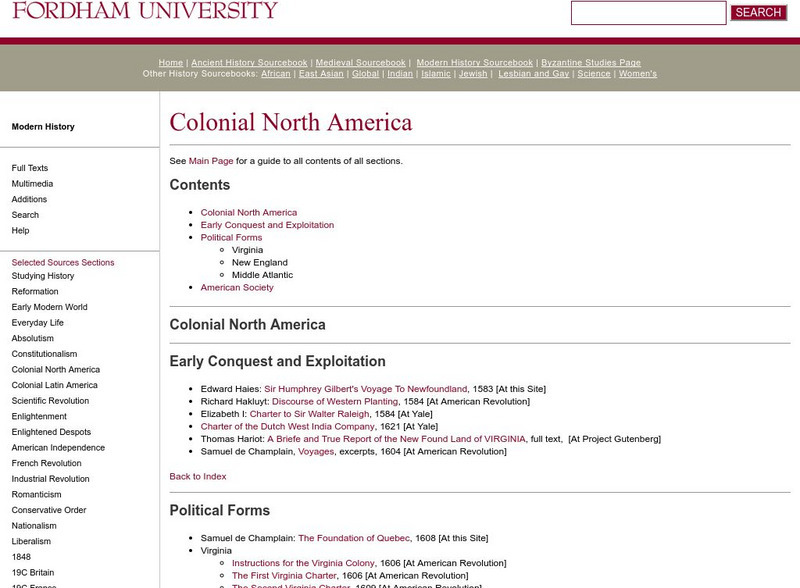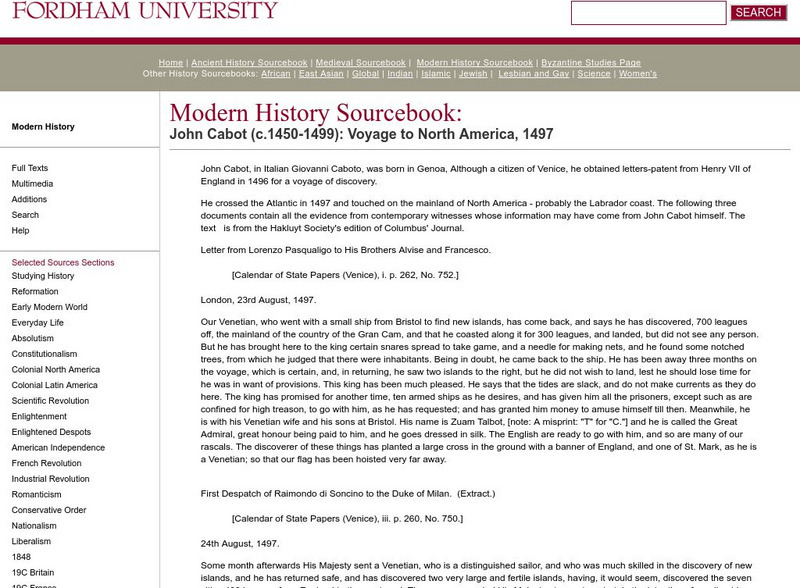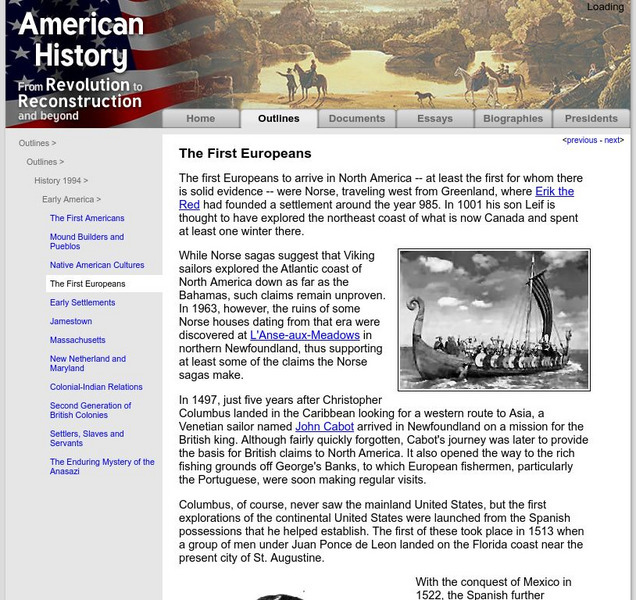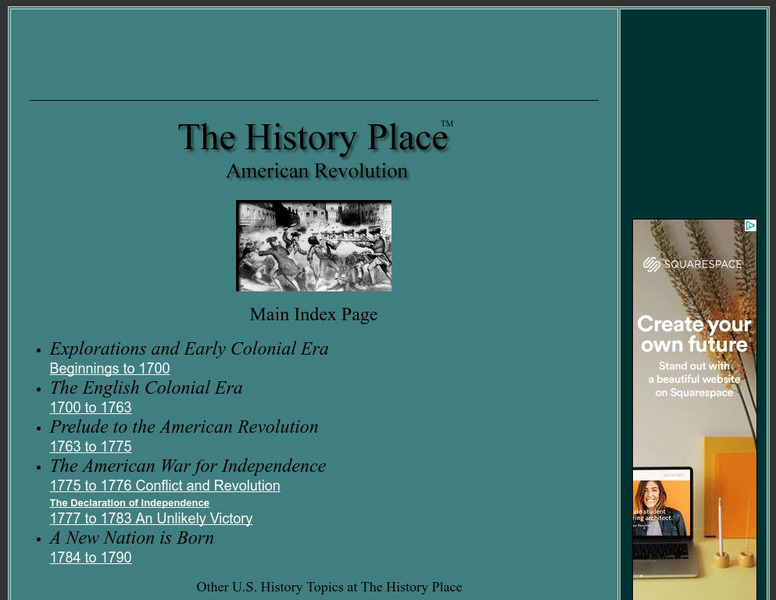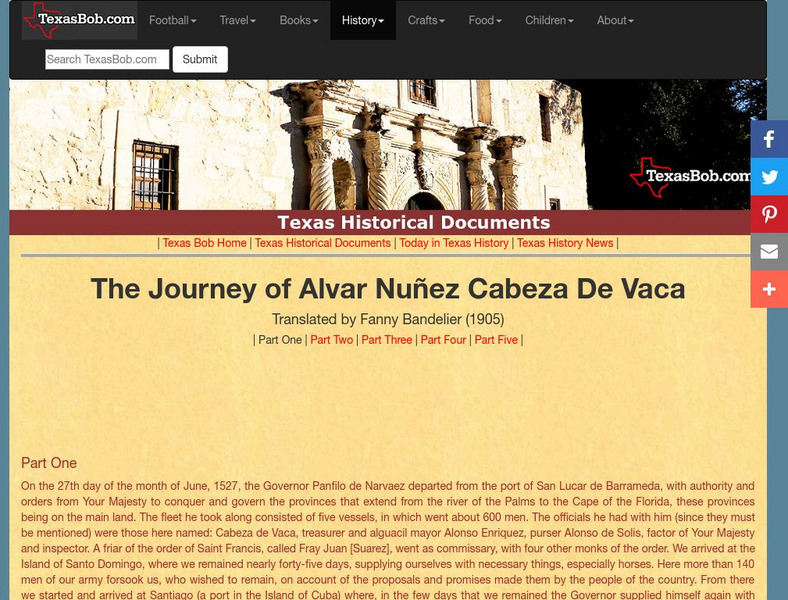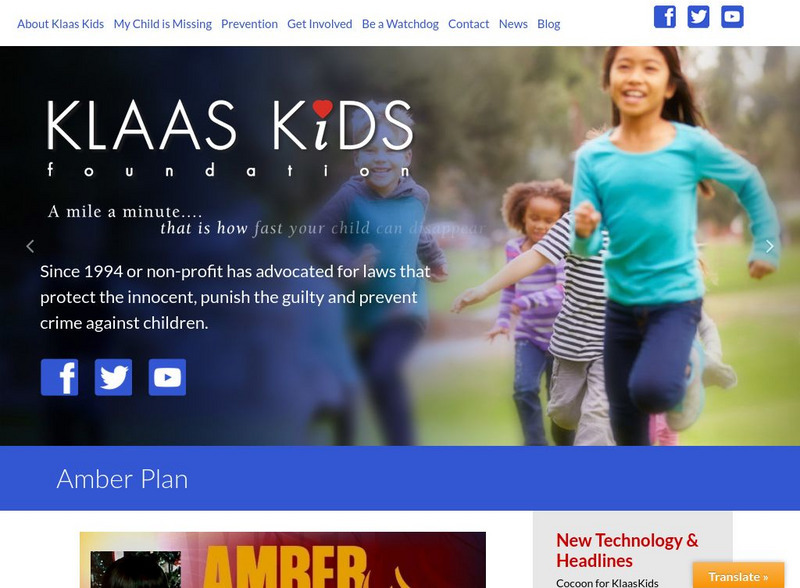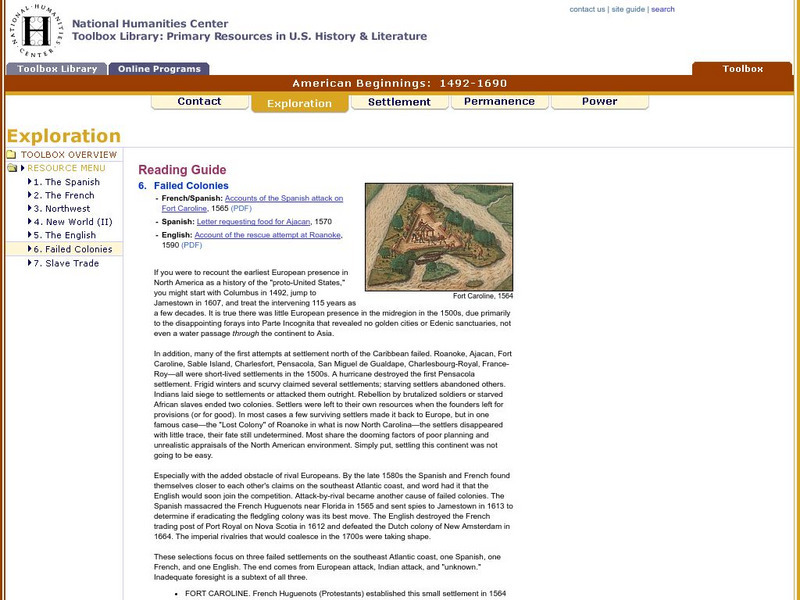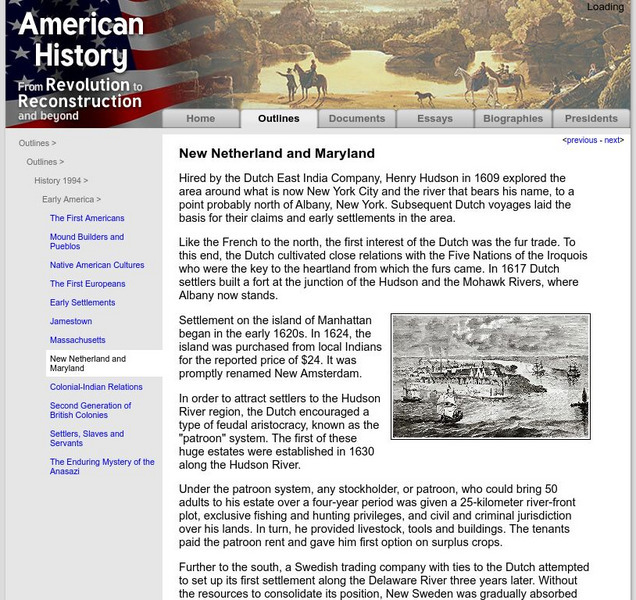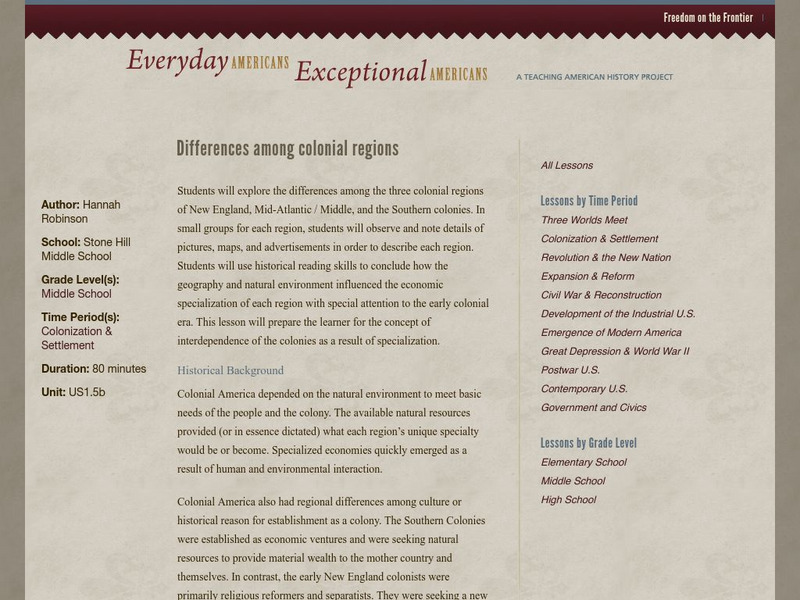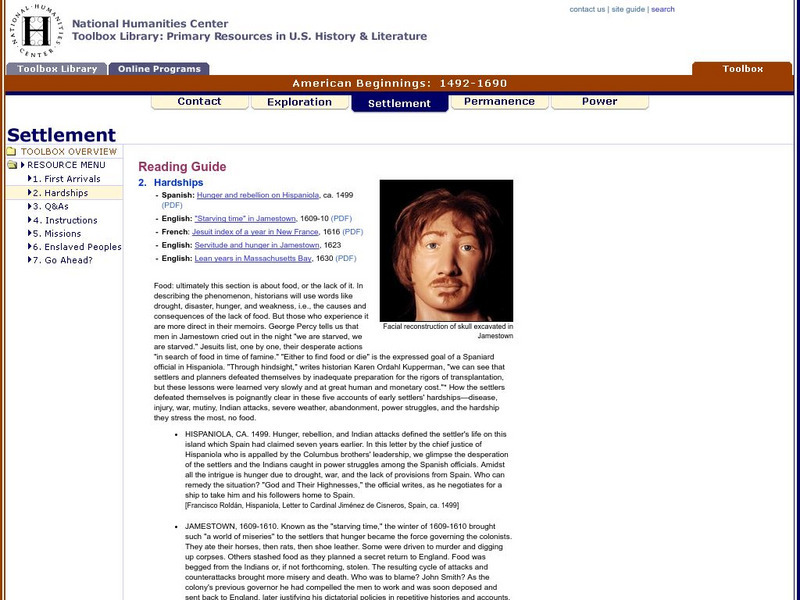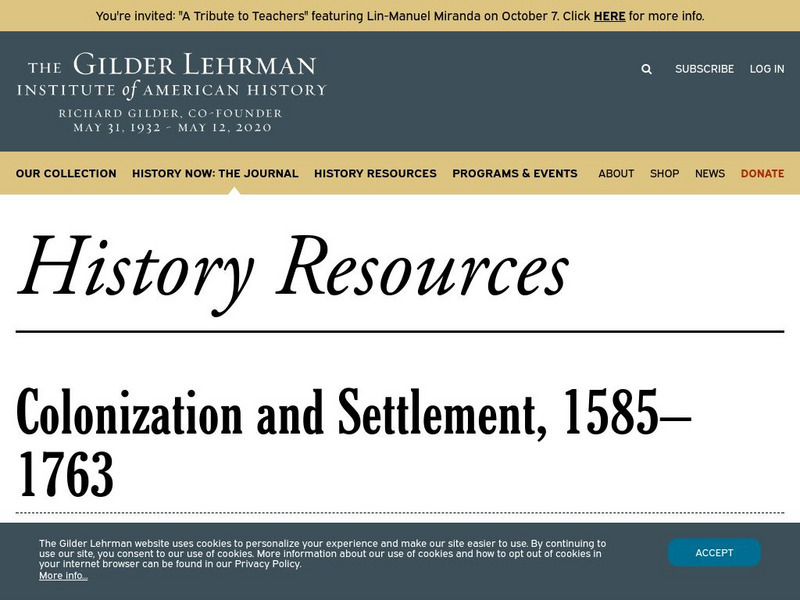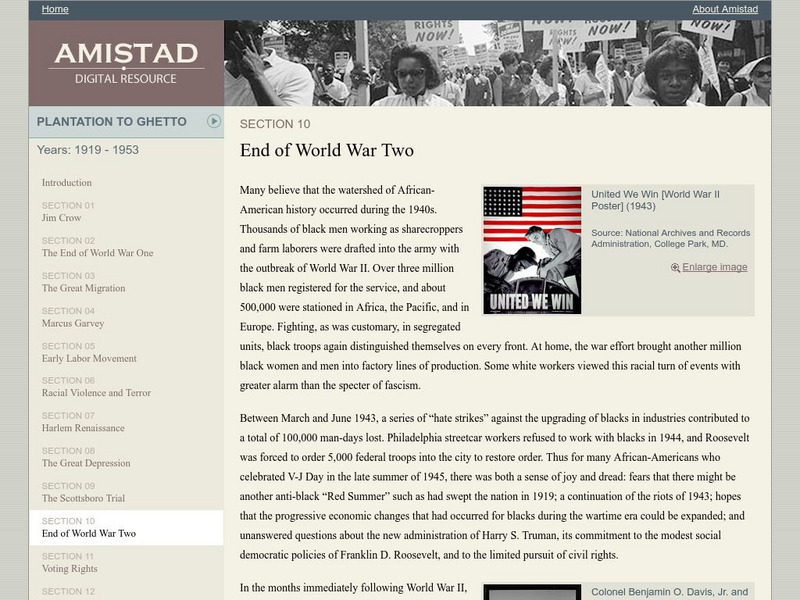Internet History Sourcebooks Project
Fordham University: Modern History Sourcebook: Colonial North America
Scroll through this site from the Modern History Sourcebook of Fordham University to New England and click on the primary source documents concerning Edmund Andros. This site contains dozens of links related to colonial America. Sections...
Internet History Sourcebooks Project
Fordham University: Modern History Sourcebook: John Cabot: Voyage to North America, 1497
Letters from Cabot to different people in his life that explain his exploration and his discoveries.
University of Groningen
American History: Outlines: The First Europeans
The first Europeans to arrive in North America -- at least the first for whom there is solid evidence -- were Norse, traveling west from Greenland, where Erik the Red had founded a settlement around the year 985. In 1001 his son Leif is...
State Library of North Carolina
N Cpedia: John W. Kinchelo, Iii: American Indians at European Contact
Native Americans inhabited the New World long before European explorers began establishing settlements on the land. This entry addresses the challenges the natives had to face upon Europe's arrival, trials in relationships, and how...
The History Place
The History Place: American Revolution
The History Place provides this timeline broken into six different sections that highlight the important events from the early European exploration of America through to the United States becoming a country. Features include informative...
Other
Texas Bob: The Journey of Alvar Nunez Cabeza De Vaca
An English translation of Cabeza De Vaca's first-hand account of his journey and quest to claim territory from Florida to Mexico for Spain.
University of Groningen
American History: Outlines: The First Europeans
The first Europeans to arrive in North America -- at least the first for whom there is solid evidence -- were Norse, traveling west from Greenland, where Erik the Red had founded a settlement around the year 985. In 1001 his son Leif is...
Curated OER
Etc: Dev of Colonies and Early Western Explorations, 1700 1775
A map of eastern North America showing the early development of the European colonies and westward exploration to the Mississippi River. The map shows the routes of several early explorers with dates of exploration, including La Salle,...
Library of Congress
Loc: American Memory: African American Odyssey
This site explores Black America's quest for equality from the early national period through the twentieth century. Content includes the work of abolitionists in the first half of the nineteenth century, depictions of the long journey...
Other
Bringing History Home: Communities Long Ago
This Grade 1 unit explores U.S. communities in a historical context. By exploring their own community's buildings and services of both long ago and today, children in non-Native American communities are introduced to concepts of change,...
Other
Klass Kids Foundation: Amber Plan
This resource explores the Amber Plan by state. Learn what the Amber plan is, how the plan works, and what the initial criteria are to put the plan in action. Content also includes a state-by-state analysis of the Amber plan in each area.
Colonial Williamsburg Foundation
Colonial Williamsburg: Colonial Religion
The site provides a detailed overview of role religion played in the lives of the colonists. Content explores how religion played a part in the Revolution, and the statute for religious freedom, as well as providing a lesson plan, a link...
National Humanities Center
National Humanities Center: Toolbox Library: Failed Colonies, American Beginnings: 1492 1690
Three European accounts of the disappointments, challenges, and outright failures to establish early successful colonial outposts in North America.
University of Groningen
American History: Outlines: New Netherland and Maryland
Find out about Dutch exploration and settlement in the area explored by Henry Hudson. Scrolling through will take you to information about New Netherland and the settling of New Sweden which later became Maryland.
George Mason University
Chnm: Differences Among Colonial Regions
Students will explore the differences among the three colonial regions of New England, Mid-Atlantic/Middle, and the Southern colonies. In small groups for each region, students will observe and note details of pictures, maps, and...
Curated OER
Etc: Early Discoveries and Explorations, 1497 1621
A map of the eastern coast of North America showing early European exploration from the voyages of Cabot (1497 and 1498) to the founding of New Netherlands in 1621. The map shows voyage routes, coastal features, rivers, and settlements...
Curated OER
Etc: Maps Etc: French Explorations and Forts, 1600s
A map of North America showing the routes of early French exploration of the Mississippi Valley from the Great Lakes to the Gulf of Mexico in the 1600's. The map shows the routes of Father Jacques Marquette (with Louis Jolliet) and...
Curated OER
Etc: Early Explorers of the Atlantic Coast, 1492 1620
A map of the Atlantic coast of North America from the Labrador Peninsula and Gulf of St. Lawrence south to the Santee River in the Carolinas, showing the European explorations and settlements in the region between 1492 and 1620. The map...
Curated OER
Early Settlements in New England and Distribution of the Indian Tribes, 1686
A map of the Dominion of New England (1686), showing the early settlements and the general tribal lands of the Pawtuckets, Massachusetts, Wampanoags, Narragansets, Nipmucks, Pequods, and Mohegans. "New England, a collective name given to...
National Humanities Center
National Humanities Center: Toolbox Library: Hardships, American Beginnings: 1492 1690
Three English, a French, and a Spanish primary account of the staggering losses, misery, and deprivation that characterized early European settlement as well as the resilience needed to overcome those challenges.
Gilder Lehrman Institute of American History
Gilder Lehrman Institute: Colonization and Settlement
[Free Registration/Login Required] An overview of all the materials that are available to students to explore the colonization and settlement of the Americas.
Wikimedia
Wikipedia: New France
An overview of New France, from the time the French first began to explore the area until they ceded Canada to the British (Treaty of Paris, signed in 1763). Includes a discussion of the founding of Quebec City and early maps of the...
Other
Amistad Digital Resource: End of World War Two
Narrative explores the role of African Americans after World War II ended and the state of the civil rights movement from the 1940s to the early 1050s.
University of Texas at Austin
Ut Library Online: Historical Maps of the United States
This extensive collection of Historical United States maps from the University of Texas Library Online cover early inhabitants, exploration and settlement, territorial growth, military history, and later historical maps. These maps are...


